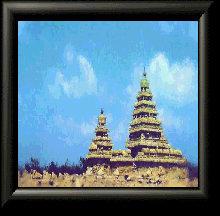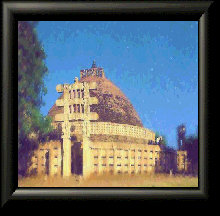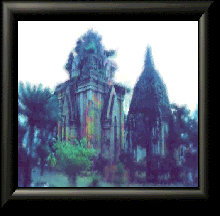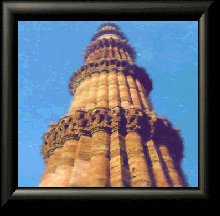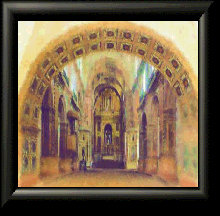
(p14) The Chapter
3 New Nippurland 4
The citizens of the inside of the castle
were risked by chlorine gas, and though the eye was congested and
a cough and nasal mucus were passed, they praised the virtue of
Ravana.
Ravana started collecting mercenary soldiers again,
in order to reorganize his collapsed army.
He has been
completely fascinated with the might of a toxic gas weapon.
He encouraged to scientists to make a more powerful new weapon,
in order to make the Hara army destroy completely.
Rama
who heard the report of Hanumat was enraged at the opponent having
used the forbidden weapon YsiKHa.
"If the enemy appears
in such a means, I also have an idea."
King Rama made
the decision which devastates Lanka city thoroughly using an extreme
weapon " Zolaph."
The Zolaph was the weapon of
the tradition of having been invented in the Muiland of 10,000 years
ago.
Research of ancient culture was prosperous in Haraland.
They had succeeded also in restoration of the Zolaph.
The Zolaph is an ammonium-nitrate oily medicine explosive.
The might reached by about 10 times the gunpowder generally known
those days.
The Lanka city was the most beautiful city
in India.
Rama lamented devastating the city.
However, the spy reported to him.
"Ravana gets
carried away and is developing the still vicious weapon."
It was the high-explosive projectile "Paspata."
It prepared the iron fragment into the jar of Hwang copper
with which blasting powder was got blocked.
With a catapult,
it is dropped and is exploded.
It was the structure which
makes an opponent full of holes with the fragment of the iron which
jumped out.
The scientists of Lanka city invented the fuse
of a Paspata.
They had the capacity which refines a priming
powder.
They made the ethyl alcohol distilled in the solution
which melted mercury react to nitric acid.
This priming
powder was used for the fuse of a Paspata.
However, the
degree of refining of this priming powder was bad.
It was
the unsafe thing which causes accidental discharge, when the shock
was carelessly given during conveyance.
In BC 2277 years,
the general Bharata who received King Rama's command commanded the
soldiers of 50,000, and surrounded the Lanka city again.
The New Nippur army was obliged to the siege again.
The
Hara army learned a lesson from the last failure, and was line-upped
in the place 1km away from the rampart.
And they avoided
turning on the lee.
Since it line-upped in the distance
from the rampart, the new Nippur army was not able to use a Paspata,
not to mention a YsiKHa.
They were put on the state of
stock long silence.
Three days after, the Hara army approached
the rampart from the windward.
They projected the shells
made from cast iron from the discharge equipment using blasting
powder called a Ashany.
The shells arrived at the 1km away
inside of a castle.
Castle soldiers thought that bombs
fell and they evacuated.
But, they did not carry out explosion
but black mucus has fallen from inside.
It was the incendiary
bomb the "Nalayana" which mixed crude oil with black powder
and a mixed medicine of yellow phosphorus.
They have detected
that the enemy appeared in incendiary strategy.
The new
Nippur army took fire-fighting organization immediately.
Aas expected, the Hara army has discharged the incendiary flying
spear a "Agneya" to the inside of a castle using Ashanies.
The ball made from cotton was attached at the tip of a Agneya.
The naphtha which distilled crude oil was infiltrated into
it.
The fire broke out in the everywhere of the inside
of a castle.
But, the new Nippur army equipped fully with
water service equipment was not shaken at the beginning.
They took with sufficient performance to fire-extinguishing work.
But, the Nalayana which ignited with the flame of a Agneya
raised the violent pillar of fire, and however they might pour water,
it did not disappear.
While the new Nippur army was confused,
the Hara army projected the Nalayanas one after another.
The Hara army checked that Lanka city was destroyed by fire.
They projected the shells only containing crude oil intensively
this time.
Those shells poured on the new Nippur soldiers
who took time in fire extinguishing of Nalayanas, and they were
destroyed by fire violently and emitted a high fever.
The
fire-extinguishing unit covered sand hurriedly, or covered cloth,
and kneaded measure.
But, the fire spread in an instant.
Checking that the city region of Lanka had been destroyed by
fire, the general Bhalata ordered projection of Zolaphs.
The dropped Zolaphs were exposed to surrounding high fevers, induced
explosion simply, and caused large explosion.
The rampart
and the building were destroyed with the roaring sound.
The new Nippur army used the Paspata to the Hara army which has
intruded into the inside of the castle.
Since the circumference
was the sea of fire, these bombs hardly became the misfire but were
exploded efficiently.
They inflicted serious damage on
the rush unit of the Hara army.
The Hara army withdrew
confusedly and started the Zolaph attack again.
The city
north half is destroyed and Ravana surrendered in the stage for
which the fire pressed the imperial castle.
General Bharata
caught and bound Ravana and took it to the Hara city.
Ravana
prostrated himself and he apologized for his fault to King Rama.
"The purpose of my original is revenge of father and an
elder brother". He excused himself.
King Rama sympathized
with the circumstances of Ravana who is the same Aska descent.
King Rama decided to forgive a crime, on condition that Mr.
Ravana and a heavenly posterity tribe leave from India.
The territory in new Nippur was transferred to King Hanumat.
As for the Lanka city, the name was replaced with e "Hari
city."
Hari is Shiva's alias in which they believe.
Although the street was rebuilt, prosperity of a like before
was not seen for it.

